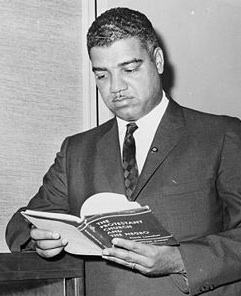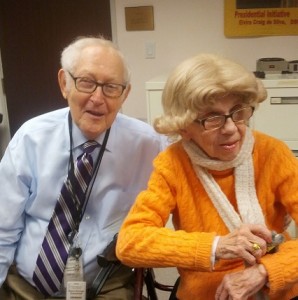Friend Remembers Social Work Hero, Whitney Young

Whitney Young Jr. was president of the National Association of Social Workers from 1969 until his tragic death in 1971.
A new generation of Americans will learn about often forgotten social worker and Civil Rights leader Whitney M. Young Jr. when PBS stations around the nation air the documentary “The Powerbroker: Whitney Young’s Fight for Civil Rights” beginning Feb. 18.
That film, by Young’s niece Bonnie Boswell, will look at how Young was a behind-the-scenes negotiator who used his social work skills to address racial and economic injustice.
The film features one of the last recorded interviews with another social worker legend, longtime National Council of Negro Women President Dorothy I. Height and interviews with Julian Bond, Rep. John Lewis (D-Ga.), and other Civil Rights leaders.
Young, who tragically drowned in Lagos, Nigeria in 1971 at age 49, helped organized the 1963 March on Washington and was executive director of the National Urban League and president of the National Association of Social Workers.
But to social worker Margery Carpenter, MSW, ACSW, Young will always be the charming and witty classmate who sat behind her in class at the University of Minnesota School of Social Work and loved to joke and chatter.
Margery Carpenter and her husband, Kenneth Carpenter, MSW, ACSW, befriended Young and had him as a guest at their home. What does Margery hope Boswell’s film will accomplish?
“I hope viewers will get to know him as a great guy who managed to get along remarkably well with folks of all shapes and sizes,” she said.
Some National Association of Social Workers state chapters are taking part in community screenings of the “The Powerbroker: Whitney Young’s Fight for Civil Rights” this month in conjunction with the Independent Television Service (ITVS) and other local organizations. Other chapters are hosting their own screenings. Please contact your state chapter to see if they are participating. Check your local PBS listings to find out when the film is airing in your area.
Boswell is an award-winning television reporter, producer, commentator and talk show host based in Los Angeles. She has worked for years to create a film to spotlight her uncle’s contributions to the Civil Rights movement.
Young was known as a moderate who was adept at getting disparate groups to work together to achieve Civil Rights goals. He also focused more on using private meetings to open economic doors for blacks instead of doing public protests to achieve goals, so he is not known as well as other leaders of the era.
However, Margery Carpenter remembers how brave Whitney Young could be.
Young became social work dean at Clark Atlanta University in 1954. When Margery Carpenter visited Atlanta Young invited her out for a meal, an action that presented dire safety and professional risks for Young considering Atlanta was still racially segregated and black men and white women did not socialize publicly in that time and place.
To go out and eat Young arranged to meet Carpenter at a street corner, where she was told to hop in the car as soon as he opened the door so they could get to the restaurant without attracting unwanted attention. He dropped her off in the same way.
“He jumped fast and I jumped fast,” she said.
Carpenter said she was young so probably didn’t fully realize the danger.
“I didn’t think,” she said. “I didn’t get upset about it. I was cautious and careful.”
Years later Young and Margery and Kenneth Carpenter became active in the International Council on Social Welfare (ICSW). When the group had a conference in Washington, D.C., the Carpenters hosted a reception for Young and other ICSW members at their home.
Margery Carpenter said Young’s untimely death was a huge blow to the Civil Rights and social work communities. Although the film will tell the public about Young’s great accomplishments Margery Carpenter said she will always remember him as a friend who shared her commitment to helping others.
“We were good pals,” she said. “He had a good sense of humor.”
To learn more about Whitney Young and his legacy read this teaching guide from the National Association of Social Workers. NASW is also pushing for passage of the Dorothy I. Height and Whitney M. Young Jr. Social Work Reinvestment Act. That legislation is designed to explore and address challenges that limit the profession’s ability to help millions of people in the future.
| Leave A CommentAdvertisement
Leave a Comment
You must be logged in to post a comment.



